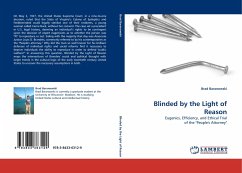On May 2, 1927, the United States Supreme Court, in a nine-to-one decision, ruled that the State of Virginia's Colony of Epileptics and Feebleminded could legally sterilize one of their residents, a young woman called Carrie Buck, without her consent. The case set a precedent in U.S. legal history, deeming an individual's rights to be contingent upon the decision of expert eugenicists as to whether the person was "fit" to reproduce or not. Siding with the majority that day was Associate Justice Louis D. Brandeis, commonly referred to by his contemporaries as the "People's attorney." Why did the man so well known for his brilliant defenses of individual rights and social reforms find it necessary to deprive individuals the ability to reproduce in order to defend "public welfare?" In answering this question, Blinded by the Light of Reason maps the intersections of Brandeis' social and political thought with larger trends in the cultural logic of the early twentieth century United States to uncover the necessary assumptions in both.
Bitte wählen Sie Ihr Anliegen aus.
Rechnungen
Retourenschein anfordern
Bestellstatus
Storno








